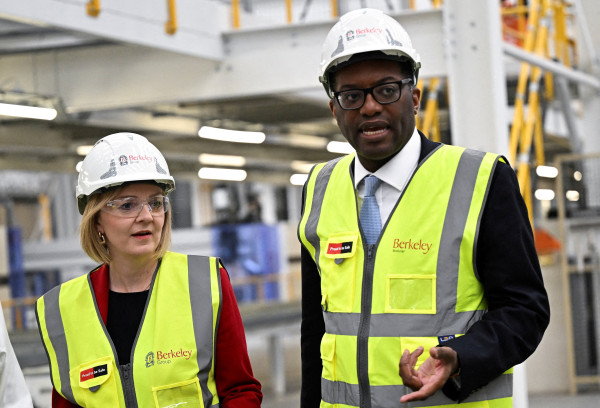

The country has barely got its breath back following the death of Queen Elizabeth II, the proclamation of Charles as King and the unveiling of government plans in response to the cost of living crisis.
Now, the mini-budget published just last Friday – announcing a £45bn tax-cutting plan – has sent the pound crashing, pensions funds and insurance giants rushing to sell bonds and mortgage lenders to pull deal after deal in efforts to stay solvent.
And as a result, the Bank of England has stepped in to launch a temporary bond-buying programme; in other words, it is trying to bail out a government plan five days after it was introduced, to shore up the health of the UK economy.
One of the clearest identifiers of that health is the housing market, so a key question is how damaging the government plans will be to the mortgage market, and is it a case of getting worse before it gets better?
'Utter carnage'
It is fair to say there is panic in the air. And that fear is filling the vacuum between now and November 23 – the date earmarked for when chancellor Kwasi Kwarteng will set out further details to the government’s fiscal rules.
The BoE has also said it will “not hesitate to change interest rates”, while lenders have warned of rates increasing to almost 6 per cent.
Paul Neal, equity release and mortgage adviser at Missing Element Mortgage Services, describes the situation as “utter carnage”.
Neal says: “The wheels are coming off the mortgage market. Lenders are still withdrawing products, leaving brokers unsure when they will actually open again. We currently have 22 lenders who have stopped lending completely, and this list is only getting longer. Without mortgages, the property market could go pop.
“Many of our clients are in a Mexican stand-off between pulling the trigger on a property transaction and fleeing the market altogether. So many are unsure about whether to proceed. We have a mixture of clients who are rushing to get their applications in, and others standing off and waiting to see what the future holds.”
Prices to fall?
Graham Cox, director of Self Employed Mortgage Hub, is concerned house prices could fall by 20 per cent or more over the next three years.
"I'll be accused of being a doom-monger, but if you use simple maths and common sense, how can house prices not fall?" Cox says.
"A lack of housing supply won't help one iota when mortgage rates are somewhere between 5 per cent and 7 per cent, as is likely over the coming months.
"Housing is vastly overpriced and decoupled from average wages thanks to extended terms, higher income multiples and, above all, dirt cheap rates. With rates on the rise, the decade-long property bubble is about to burst. The worm has turned. It's a buyer's market now."
Another mortgage broker predicting a steep fall in house prices is Raymond Boulger. He says he expects prices to fall by about 10 per cent from their current level by the end of next year, but that is on only half the increase that has been seen in the last two years.
He adds that most borrowers since the financial crisis will have been stress tested at about 7 per cent, so in theory should be able to afford current higher rates, but that stress testing did not factor in the huge increase in the cost of another item of essential expenditure – energy costs.
"Because of the large increase in property prices most people, even those who borrowed 95 per cent, will have equity in their property and as most people are on a fixed rate they will have time to think about whether they can afford the new higher rates when their current deal ends and if not take action before the risk of default, but inevitably some will leave it too late."
At the time this article was written more than 900 mortgage products had disappeared from the market.
Consumer finance site Moneyfacts.co.uk said between Tuesday and Wednesday this week there were 935 fewer residential mortgages on the market – the highest fall on Moneyfacts’ records going back to November 2011.
BoE intervention
Ben Laidler, global markets strategist at social investment network eToro, says the temporary purchase of long-dated gilts reverses the BoE's recently announced quantitative tightening bond sales plan, and has already seen bond prices rise.
But this still leaves yields more than 1 per cent higher than last week, implying an extra £1,400 annual cost for an average-sized variable rate mortgage.

He adds: “Desperate times call for desperate measures and that's exactly what we've seen from the BoE today.
“In an attempt to put out the fire that's been raging since last week's mini-Budget, the BoE has come to the rescue of the plunging UK bond market, which had started to shut down the UK's mortgage market and be much more damaging than the headlines of weaker sterling.”
It is impossible to know where prices will be in six months or a year's time, but what is certain right now is that there is a huge amount of uncertainty in the market.
Rob Peters, director of Simple Fast Mortgage, adds: "If interest rates reach 6 per cent, this will certainly price some buyers out of the market and put downward pressure on property values.
“Is the British demand for property strong enough to overpower a 6 per cent interest rate? I am not sure. The property market is about to be tested like never before."
Budgets grow ever tighter
When the dust settles on the chaos in the mortgage market, the ground will have shifted and fixed rates will have risen significantly, according to brokers.
The impact on buying power will mean some incredibly difficult decisions for homebuyers, who could end up with smaller ambitions or “horribly tight” budgets, says Sarah Coles, senior personal finance analyst at Hargeaves Lansdown.
That will all take a toll on the market as it will push the home some people want out of reach as lending criteria will get stricter.
Coles adds: “A combination of rapidly rising prices, higher mortgage rates and a wider squeeze on their finances will mean they just can’t stretch to higher mortgage payments.
“Even if they’re prepared to push their budget to the limit, their mortgage lender may have other ideas. Factoring all this into mortgage affordability calculations may mean they can’t find anyone prepared to lend to them.”
Going forward, Lucian Cook, head of residential research at Savills, says he expects to see a period of lower transaction levels, adding that it is difficult to predict precisely what the future holds for the mainstream housing market.
Cook adds: “As a minimum, that indicates a hiatus in the market over the immediate term. Thereafter, a lot depends on the impact on the cost and availability of mortgage debt over the medium term and the extent to which policymakers and lenders seek to mitigate the potential impact of a sharp increase in interest rates.
“From a new buyer’s perspective, significant increases in interest rates will limit the level of debt they are prepared to take on or able to secure from their lender.
"So in the immediate future, we would expect a lot of potential buyers – particularly those reliant on high loan to value borrowing – to sit on their hands, especially given the general levels of uncertainty in the mortgage markets.”
Clients look to advisers
Carl Shave, director at Just Mortgage Brokers, agrees.
He says while currently it is “virtually impossible” to advise and subsequently secure a product for a client, he believes stability will follow shortly as the current market cannot be sustained as it is. However, the unknown is what this will look like.
His firm has been inundated with calls and emails from anxious clients, causing resources to be stretched as they offer advice to many more clients. In some cases, time is of the essence.
On the future of the market, Shave says: “Adjustments will be made mentally to the increased rates and while the housing market may stutter, I believe it will swiftly stabilise owing to the continual demand and supply issue,” Shave adds.
To start fixing the problem Shave says government interaction is needed, but it does not necessarily need to be in the guise of direct consumer/borrower assistance, for example payment holidays.
He adds: “While the BoE and the government are independent of each other – which looks to ensure there is no political bias in decision-making – this is one instance where they need to work together to find a solution.
"Clear and concise information for the public is required; not political or cryptic speeches.”
Many might remember that during Liz Truss and Rishi Sunak’s campaign tour for leadership of the Conservative party, in one of the debates, Sunak said: “Borrowing your way out of inflation is not a plan, it is a fairy tale.”
That fairytale has turned into a nightmare for many.
Ima Jackson-Obot is deputy feature editor at FTAdviser



